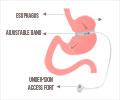Bariatric surgery is suggested for the morbidly obese individuals to reduce their risk of metabolic diseases.

TOP INSIGHT
Patients with a BMI below the 40 cut off have greater chances of achieving a BMI less than 30.
But the odds of achieving this goal were much higher for those who had their weight-loss operation while they were still below the "morbid obesity" BMI level of 40. On the other end of the spectrum, less than 9 percent of those who went into surgery with a BMI above 50 got down to 30 or below in the first year.
Getting down to a BMI under 30 also brought patients much better odds of escaping weight-related health risks. Those who hit this level were much more likely to report that they'd stopped taking medication to control high blood pressure, blood sugar and cholesterol, and achieved remission of an obesity-linked breathing condition called sleep apnea.
In all, 92 percent of those who hit a BMI under 30 in the first year said they were highly satisfied with their decision to have surgery, compared with 78 percent of those who didn't get to that level.
The findings, published in JAMA Surgery by a team from the University of Michigan, Wayne State University and Henry Ford Health System, could help surgical teams counsel prospective patients about realistic expectations and the best timing for surgery.
"Despite its proven safety and efficacy, bariatric surgery remains highly regulated and can be misunderstood by referring physicians and patients alike," says lead author Oliver Varban, M.D., director of bariatric surgery at Michigan Medicine, U-M's academic medical center.
The National Institutes of Health has established a BMI of 40, or more than 100 pounds over their ideal weight, as the lowest level for patients to be considered for bariatric surgery.
The NIH also sets a BMI threshold of 35 for those who have already begun to experience weight-related health conditions such as Type 2 diabetes, high blood pressure, sleep apnea, high cholesterol and heart disease.
Many insurers require that patients try medically supervised weight-loss programs, often for a year or more before they will cover the operation, and plans may set other conditions such as screening tests, psychological examinations and other documentation by the doctor who refers the patient for the operation.
The authors hope their new results will inform those referrals and coverage requirements. "Bariatric surgery is extremely safe and effective and should be considered as first-line therapy for patients with a BMI between 35 and 40," says Varban, an assistant professor of surgery at the U-M Medical School.
"Waiting for a patient to reach a BMI over 50 only serves to limit the benefits of bariatric surgery as an intervention."
Source-Eurekalert
 MEDINDIA
MEDINDIA




 Email
Email









